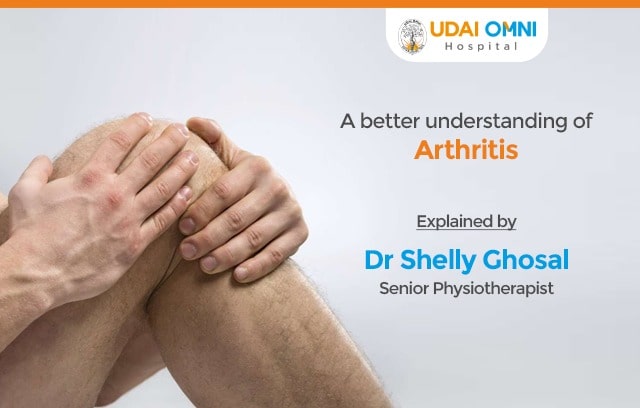A better understanding of Arthritis
Ageing causes normal wear and tear of the joints. Overloading, overuse or trauma to the joints can lead to arthritis. Arthritis is predominantly the inflammation of one or multiple joints. It usually presents with pain, stiffness, swelling and tenderness of the joints. The most common types of arthritis are osteoarthritis and rheumatoid arthritis.
Osteoarthritis:
Bone is covered with cartilage that acts as padding between the joints. Early erosion of this padding along with the rubbing of bony ends leads to Osteoarthritis.
Symptoms: People usually present with painful and stiff joints, especially after a period of inactivity, restricted mobility, and visible deformities like a bow or knock knees, deformities of the finger and swelling on the joints are also common.
What causes osteoarthritis?:
In Osteoarthritis, pain is usually caused by the thinning of the cartilage that serves as a protective shock absorber between the joints. Cartilage is important for minimizing the impact of everyday activities on the joints.
There is no single known cause of osteoarthritis, however multifactorial reasons can predispose to OA. The most common factors are as follows;
Rheumatoid arthritis:
Rheumatoid arthritis is a type of autoimmune (body’s immune response attacks its own cells) inflammatory arthritis. This means that the nervous system sends errant messages to the immune cells to attack the body’s own joint tissues.
Symptoms: of rheumatoid arthritis also include painful swelling, stiffness and deformities of the joints, most commonly in the hands, wrists and feet (small joints). It is also associated with morning stiffness, fluctuating joint pain with or without other systemic involvement. Along with X-rays and clinical evaluation, certain blood investigations confirm the presence of Rheumatoid Arthritis.
What cause Rheumatoid Arthritis?
Although exact cause of RA is unknown, few studies state that certain groups of people are prone to developing RA based on:
How do we treat arthritis?:
Self-care and medical guidance are paramount in treating arthritis. These form the essential domains of treatment.

Identifying early symptoms and proper diagnosis form the pillar of treatment. A well balanced diet, adequate nutrition, moderate exercises, optimal weight along with medications helps in the prevention and effective treatment of arthritis.


